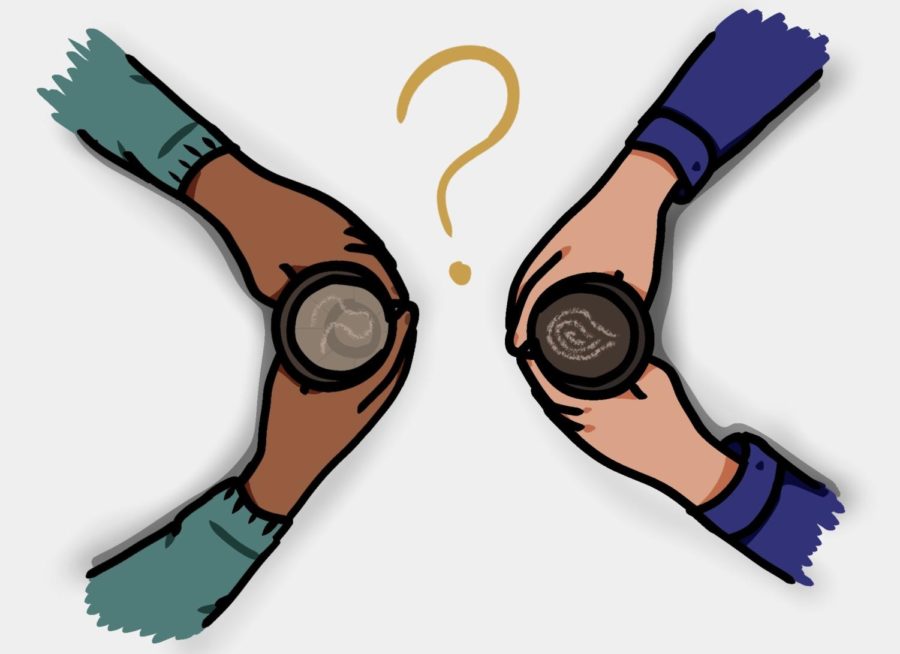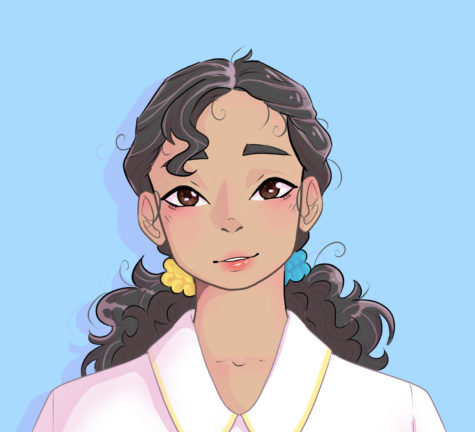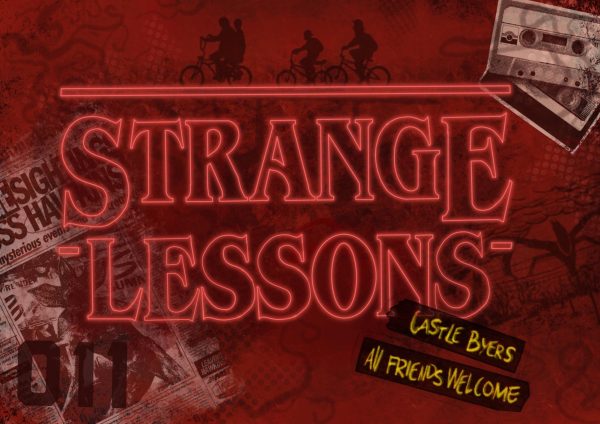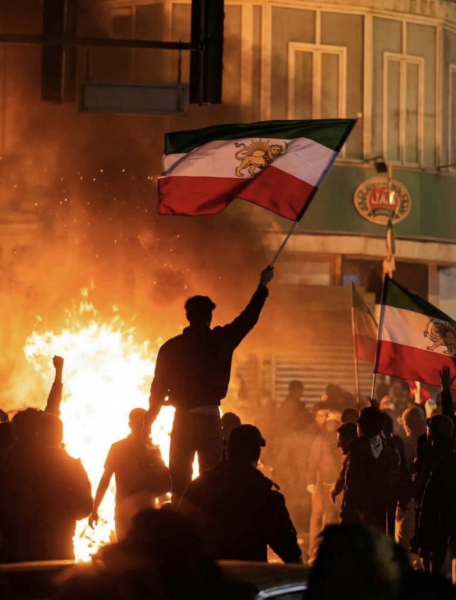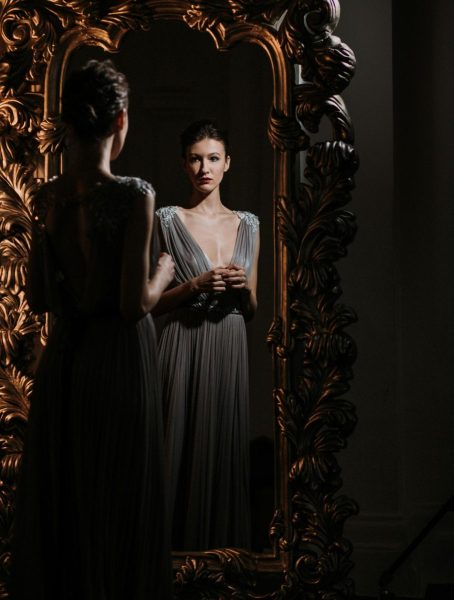Conversations with a Muslim
November 16, 2022
In a few sentences, what do you believe?
Basically, I believe that there is one God. He has no sons or daughters, no human anything. He is Allah. We believe that the people sent by him are prophets and messengers; prophets are the ones spreading the word and messengers come down with holy books. So that’s the basics of what we believe, but I know that we have a lot of prophets. One thing everyone knows is that Prophet Muhammad (Sallallahu Alaihi Wasallam) was the very last prophet, and he was also the one that brought us the Quran which is the book we currently follow.
Just to clarify, you follow Islam, but followers of Islam are not called Islams, you’re called Muslims, right?
Right. So, the religion is Islam, and if you’re a follower you are a Muslim. And it gets more complicated because there are different types of Muslims, several different types of groups. There’s sunni and shia, for example. So, when you are a Muslim, you have said “lailahaillallah muhammadarrasulullah” (directly translates to: I bear witness that there is no deity but Allah, and I bear witness that Muhammad is the messenger of Allah.) which means “yes, I believe in God,” and then you become a Mumin when you truly believe in the unseen, that there is a God even though you can’t see him. And then there is a third phase which we didn’t really get to at my last school, but I know there is a third one. But the generalised term for everyone that follows Islam, is Muslim.
Can you tell me a little bit more about where your faith comes from and what following Islam means to you?
My entire family is Muslim, except for my father who is an atheist, but I would say that the reason I am a Muslim today is because it started with my family, obviously. Because everyone around me was Muslim I didn’t really know anything different, and I also went to a Muslim school so there weren’t really other options for me at that point. But the day I genuinely chose that I wanted to be a Muslim was probably in ninth grade. We had an incident and when I really needed to recover, I turned to our holy book and I started studying it in depth, it comforted me more and I thought “yes there is a person looking over me.” So that is where my genuine faith comes from because before that it wasn’t really my faith it was just what my parents told me to do. But at that point in my life, it was like, “no I am a Muslim and I truly do believe.”
What it means to me is that I’m not alone. Especially in my culture, parents aren’t normally present or have the time for children and it’s harder to connect with people around you. Especially coming from a small, closed school I only had a few meaningful relationships, so to me it meant that I’m not alone even when I am alone. I talk to myself quite often, and it’s a terrible habit really because I start thinking out loud to other people, but I got that because I didn’t know how to start a Duaa. I would sit there and talk to God like, “What are you doing up there? Can you like stop?” So, to me it was just not being alone and having a reason to exist, which is very comforting. Especially when you’re at this stage of years 10, 11 and 12 where you need to figure out what to do with your life and knowing that even if you don’t have it figured your entire reason for being is to worship your god and follow his messengers and his book. It’s a reason for living, you don’t feel lonely, and it gives you hope that there is something for you even after you pass on.
So, picking up on what you said about going to a Muslim school. How does going to William Clarke, a Christian school, impact your faith? Especially coming from your previous school, which was quite small, to William Clarke.
With William Clarke, at the beginning I felt the size of the school, because at my old school the entire school had 300 students, the current year 12s have about 150 students. So, it’s really really small, and because it was so small the size of William Clarke was so daunting, but I only really interact with our grade, so the size didn’t really matter. It was a bit of a strange thing for me at first because it was a completely different religion, but you know, Islam and Christianity have a lot in common. I would say that many many many many of our stories are the same, up until Jesus. Right, so, Jesus in our books is a prophet, his name is Prophet Isa (Alaihis Salam). We basically do believe in him, but we believe a little differently in his story.
When we were in chapel one day, I remember the chaplain talking about this story and I noticed that it was word for word a story that we had studied in the [Quran], and I was like, “sorry, excuse me, we have this exact same story.” So, then during prelims I made a few friends and Rebekah invited me to Bible studies and GLO and I started attending them. And during Bible studies, maybe the first or second time I attended, the chaplain talked about Abraham. I’m pretty sure there are a few differences in the story, but they were basically the same to what I knew.
So, if anything all this has strengthened my belief, because if two completely different religions, at first glance, are saying the exact same things and the exact same stories, there must be truth to it then. Coming here only strengthened my belief in my religion. It was also a good chance to explore, because if you’ve only ever been exposed to one – I come from a Muslim school obviously, I went there for 10 years – so when you come from a Muslim school you don’t really get to explore other religions that much unless you do studies of religion. Coming here was a good way to see there are faiths and learn how to communicate with people that hold them.
I think it’s so interesting that it’s only strengthened your faith. Do you think it’s challenged it in any ways, or it’s just strengthened it?
No actually, not at all. My aunt was surprised when I told her this too but studying Christianity has only made me strengthen my belief in my religion, more than challenging it. Because they’re so similar it’s only confirming what I thought before. Like you guys say “amen” after you finish a prayer, right. When you do a prayer with your hands out in front of you, we call that a Duaa in Islam, and it’s like talking to God as well, so when you say “amen” we say “ameen” (pronounced: ah-mean) so it’s literally just a different pronunciation of the same word. There are a lot of other similarities too, and if two different religions are doing the same thing then there must be some connections. Like often when you see the pictures in chapel of women from that time, they are wearing the scarf, now in Christianity you obviously don’t believe that you need to wear it, but it’s from that context that Muslims draw wearing the hijab from, so there’s that correlation as well. There are so many things connecting both our religions that I can’t even say Christianity is wrong because actually it makes my faith make more sense rather than challenging it.
It’s definitely thought-provoking to hear how being at a Christian school and studying Christianity, a religion that’s similar in some ways to Islam, has strengthened your faith. Going back a little bit, you spoke about finding purpose and meaning and comfort in your faith, and for me I find great hope in salvation that comes from Jesus’ death and resurrection but obviously that’s different for you. So where does your hope come from? What does hope mean to you?
I find that hope, in one aspect, is knowing you’re not alone. Sorry, I’m not really sure how to word this…
That’s okay! Another angle to look at this through that might help, is what do you believe happens after death? Where does that greater purpose for your life come from?
So, before the Day of Judgement, there is a point where there is only Muslims by name and not by belief. And that’s when the period of judgement starts. So Jesus, or Prophet Isa (Alaihis Salam). in our book, also plays a huge part in our religion because rather than him dying he just got sent back up to the heavens. Near the Day of Judgement, he will come back down, and our belief is that he will help Muslims stay away from what comes, the Ad-Dajjal. The Ad-Dajjal we believe comes during the period before the Judgement Day and he will come up to each person and be like, “I am god. If you say you believe in me you will go to my heaven, and if you don’t you will go to my hell.” But if you choose to believe in him, his heaven is actually a disguise for hell and hell is a disguise for heaven. There is a lot of law and I could go into a bunch of stuff, because Islam is so complicated. I still feel comfort though in knowing that there is more to come. We know that there is stuff after death, and when it comes to the afterlife the most daunting thing for me is dying. I would say that I am still trying to come to terms with even just losing youth and growing up, knowing I won’t be this beautiful in a few years, so the most comfort I get is knowing that there is so much depth and so much detail in what happens after you die. So, I don’t even see it as death, I guess. I also get a lot of hope knowing that we had so many previous messengers, people that fought for our religion, which is why we have such a large population now. There is a museum, I’m not sure where, that literally has prophet Muhammad (Sallallahu Alaihi Wasallam) clothing and other items which is only proof of his existence. So that all gives me genuine hope that yes there is a god, we’re not alone, and that there is more plan for me than what I’m seeing right now. If I keep going down this path, then hopefully after death it will keep being something good.
I know I didn’t give you this question in preparation, but I would love to ask it anyway! Often Christians talk about their favourite Bible verses or teachings that resonate with them. Are there any verses from the Quran or key teachings that have resonated with you through your faith journey?
Well with the verses, they’re all in Arabic, and I know this isn’t part of the question but because it’s in Arabic, and Arabic is such a beautiful and complex language, every word has several meanings. So people have decided to translate it however they wish to, but it’s not always the actual message. Finding a favourite verse from that and actually interpreting it correctly is quite hard, and it’s also why you see people doing the wrong thing in the name of Islam which is completely incorrect and against our book altogether. So, I can’t really choose a verse because I’m not all that good at Arabic, much less translating it.
I would say that one teaching that stuck with me, especially as I moved schools, was not to be afraid to express that I’m Muslim. I wore the hijab because it was part of school uniform. I would go outside wearing the hijab and I have been filmed, spat on, screamed at, “why are you wearing a hijab?!” and it was not fun. When that happened to me or my aunt would be walking with her hijab on and someone would be following her from behind they’d ask, “why do you follow Islam?” I’ve been approached on holiday too and the conversation often goes…
“Are you Muslim?”
“Yeah.”
“Well let me tell you why you shouldn’t be”
So, it was a huge fear coming to this school knowing that I would be expressing that I’m Muslim. Our sheik (islamic religious teacher) taught us not to be afraid that you’re Muslim. Tell people that you’re Muslim and when they question you why, tell them that this is your faith and go on to tell them why it is you believe in it. Which I’ve done, and at this school anyone that I’ve expressed that with has shown nothing but kindness and understanding too. It’s one of the most important teachings of my life because if I didn’t continue that way I probably would’ve stayed silent about being Muslim this entire time; I wouldn’t be doing this interview with you. When I say a verse, there isn’t really a specific verse, but more an entire Surah, like a chapter: Al-fatiha, which is my name. It is the opening of the Quran, and it just gives me comfort for god knows what reason.
I have one more question for you. Is there anything else you’d like our We Are readers to know about Islam, or you personally?
Well for me, just come and approach me! If you want to talk to me about Islam, or you’re a Muslim and you want to that there are other Muslim’s out there to talk to (and I know there are a few other Muslims at the school) I’d be happy to talk to you about it. But when it comes to what you should keep in mind about Islam, it’s that there is a lot of bad media behind it. It’s media that continually torments us every day. There are people out there doing horrible things to other people and saying things like “allahu akbar”, which is completely in the wrong context, they shouldn’t be using that at all. It doesn’t mean that they are Muslim, if you are truly Muslim you would never taint Allah’s name. So, just because someone says “allahu akbar” or “bismillah”, it doesn’t mean that they are doing this in the name of all Muslims, it means that they are tainting our god’s name. It isn’t a representation at all of what our book teaches us, because our book teaches us to always treat people fairly. Like a man’s wife should never be upset, ever, she is his biggest treasure and shouldn’t be thought of as anything less. But so many people have only seen people do things and say it’s ‘in the name of Allah’ and immediately assumed that it’s all Muslims, but it’s not. And personally, anyone that does something with bad intentions ‘in the name of Allah’ and it’s horrible, I would never consider my brother or sister, I would never consider them Muslim which is why I don’t think anyone else should. Basically, that’s it.






